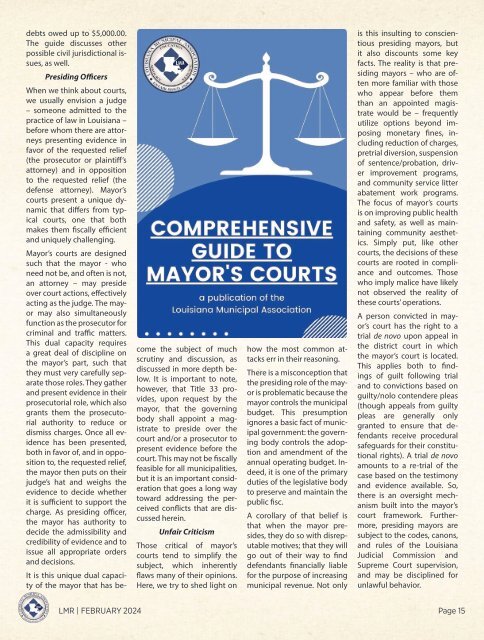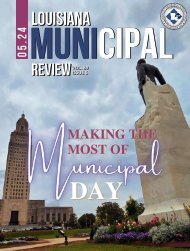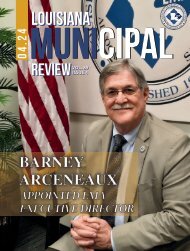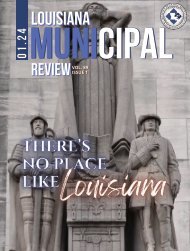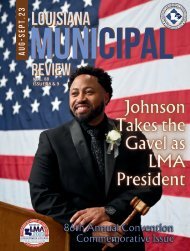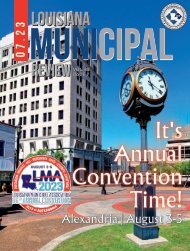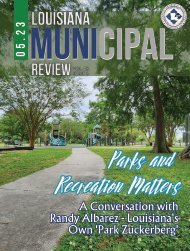You also want an ePaper? Increase the reach of your titles
YUMPU automatically turns print PDFs into web optimized ePapers that Google loves.
debts owed up to $5,000.00.<br />
The guide discusses other<br />
possible civil jurisdictional issues,<br />
as well.<br />
Presiding Officers<br />
When we think about courts,<br />
we usually envision a judge<br />
– someone admitted to the<br />
practice of law in Louisiana –<br />
before whom there are attorneys<br />
presenting evidence in<br />
favor of the requested relief<br />
(the prosecutor or plaintiff’s<br />
attorney) and in opposition<br />
to the requested relief (the<br />
defense attorney). Mayor’s<br />
courts present a unique dynamic<br />
that differs from typical<br />
courts, one that both<br />
makes them fiscally efficient<br />
and uniquely challenging.<br />
Mayor’s courts are designed<br />
such that the mayor - who<br />
need not be, and often is not,<br />
an attorney – may preside<br />
over court actions, effectively<br />
acting as the judge. The mayor<br />
may also simultaneously<br />
function as the prosecutor for<br />
criminal and traffic matters.<br />
This dual capacity requires<br />
a great deal of discipline on<br />
the mayor’s part, such that<br />
they must very carefully separate<br />
those roles. They gather<br />
and present evidence in their<br />
prosecutorial role, which also<br />
grants them the prosecutorial<br />
authority to reduce or<br />
dismiss charges. Once all evidence<br />
has been presented,<br />
both in favor of, and in opposition<br />
to, the requested relief,<br />
the mayor then puts on their<br />
judge’s hat and weighs the<br />
evidence to decide whether<br />
it is sufficient to support the<br />
charge. As presiding officer,<br />
the mayor has authority to<br />
decide the admissibility and<br />
credibility of evidence and to<br />
issue all appropriate orders<br />
and decisions.<br />
It is this unique dual capacity<br />
of the mayor that has become<br />
the subject of much<br />
scrutiny and discussion, as<br />
discussed in more depth below.<br />
It is important to note,<br />
however, that Title 33 provides,<br />
upon request by the<br />
mayor, that the governing<br />
body shall appoint a magistrate<br />
to preside over the<br />
court and/or a prosecutor to<br />
present evidence before the<br />
court. This may not be fiscally<br />
feasible for all municipalities,<br />
but it is an important consideration<br />
that goes a long way<br />
toward addressing the perceived<br />
conflicts that are discussed<br />
herein.<br />
Unfair Criticism<br />
Those critical of mayor’s<br />
courts tend to simplify the<br />
subject, which inherently<br />
flaws many of their opinions.<br />
Here, we try to shed light on<br />
how the most common attacks<br />
err in their reasoning.<br />
There is a misconception that<br />
the presiding role of the mayor<br />
is problematic because the<br />
mayor controls the municipal<br />
budget. This presumption<br />
ignores a basic fact of municipal<br />
government: the governing<br />
body controls the adoption<br />
and amendment of the<br />
annual operating budget. Indeed,<br />
it is one of the primary<br />
duties of the legislative body<br />
to preserve and maintain the<br />
public fisc.<br />
A corollary of that belief is<br />
that when the mayor presides,<br />
they do so with disreputable<br />
motives; that they will<br />
go out of their way to find<br />
defendants financially liable<br />
for the purpose of increasing<br />
municipal revenue. Not only<br />
is this insulting to conscientious<br />
presiding mayors, but<br />
it also discounts some key<br />
facts. The reality is that presiding<br />
mayors – who are often<br />
more familiar with those<br />
who appear before them<br />
than an appointed magistrate<br />
would be – frequently<br />
utilize options beyond imposing<br />
monetary fines, including<br />
reduction of charges,<br />
pretrial diversion, suspension<br />
of sentence/probation, driver<br />
improvement programs,<br />
and community service litter<br />
abatement work programs.<br />
The focus of mayor’s courts<br />
is on improving public health<br />
and safety, as well as maintaining<br />
community aesthetics.<br />
Simply put, like other<br />
courts, the decisions of these<br />
courts are rooted in compliance<br />
and outcomes. Those<br />
who imply malice have likely<br />
not observed the reality of<br />
these courts’ operations.<br />
A person convicted in mayor’s<br />
court has the right to a<br />
trial de novo upon appeal in<br />
the district court in which<br />
the mayor’s court is located.<br />
This applies both to findings<br />
of guilt following trial<br />
and to convictions based on<br />
guilty/nolo contendere pleas<br />
(though appeals from guilty<br />
pleas are generally only<br />
granted to ensure that defendants<br />
receive procedural<br />
safeguards for their constitutional<br />
rights). A trial de novo<br />
amounts to a re-trial of the<br />
case based on the testimony<br />
and evidence available. So,<br />
there is an oversight mechanism<br />
built into the mayor’s<br />
court framework. Furthermore,<br />
presiding mayors are<br />
subject to the codes, canons,<br />
and rules of the Louisiana<br />
Judicial Commission and<br />
Supreme Court supervision,<br />
and may be disciplined for<br />
unlawful behavior.<br />
LMR | FEBRUARY 2<strong>02</strong>4 Page 15


